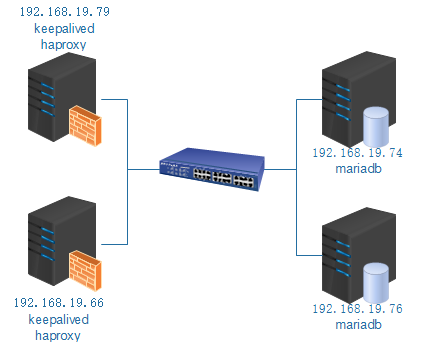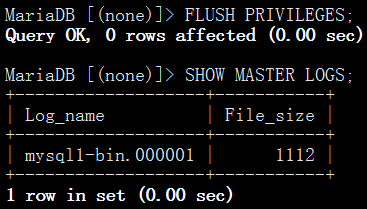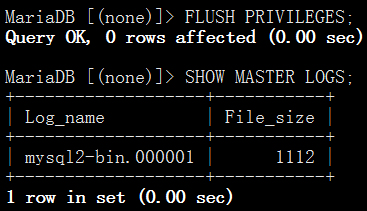利用keepalived和haproxy配置mysql的高可用负载均衡
来源:互联网 发布:梦想的数据 编辑:程序博客网 时间:2024/06/05 07:49
转载http://www.cnblogs.com/tae44/p/4717334.html
实验系统:CentOS 6.6_x86_64(2.6.32-504.30.3.el6.x86_64)
实验前提:防火墙和selinux都关闭
实验说明:本实验共有4台主机,IP分配如拓扑
实验软件:keepalived-1.2.19 haproxy-1.5.14 mariadb-10.0.20
下载地址:http://pan.baidu.com/s/1bnnYiMr
实验拓扑:

一、安装mariadb
1.在两台数据库服务器安装:
tar xf mariadb-10.0.20-linux-x86_64.tar.gz -C /usr/local/cd /usr/local/ln -sv mariadb-10.0.20-linux-x86_64 mysqluseradd -r mysqlmkdir -pv /mydata/datachown -R mysql.mysql /mydata/data/cd mysql/chown -R root.mysql .scripts/mysql_install_db --user=mysql --datadir=/mydata/data/cp support-files/my-large.cnf /etc/my.cnfcp support-files/mysql.server /etc/init.d/mysqldchkconfig --add mysqldchkconfig mysqld on
2.配置主主复制:
19.74:
----------------------------------------------->
[mysqld]
server-id = 1
datadir = /mydata/data
log-bin = /mydata/data/mysql1-bin
binlog_format = ROW
relay_log = /mydata/data/relay-log
auto-increment-increment = 2
auto-increment-offset = 1
sync_binlog = 1
sync_master_info = 1
sync_relay_log = 1
sync_relay_log_info = 1
19.76:
----------------------------------------------->
[mysqld]
server-id = 2
datadir = /mydata/data
log-bin = /mydata/data/mysql2-bin
binlog_format = ROW
relay_log = /mydata/data/relay-log
auto-increment-increment = 2
auto-increment-offset = 2
sync_binlog = 1
sync_master_info = 1
sync_relay_log = 1
sync_relay_log_info = 1
3.创建具有复制权限的用户:
19.74:
service mysqld start/usr/local/mysql/bin/mysql------------------------------------------>GRANT REPLICATION SLAVE,REPLICATION CLIENT ON *.* TO 'master'@'192.168.19.76' IDENTIFIED BY '123456';FLUSH PRIVILEGES;
19.76:
service mysqld start/usr/local/mysql/bin/mysql------------------------------------------>GRANT REPLICATION SLAVE,REPLICATION CLIENT ON *.* TO 'master'@'192.168.19.74' IDENTIFIED BY '123456';FLUSH PRIVILEGES;
4.查看二进制位置:
19.74:
SHOW MASTER LOGS;

19.76上使用相同命令:

5.配置双主:
19.74:
CHANGE MASTER TO MASTER_HOST='192.168.19.76',MASTER_USER='master',MASTER_PASSWORD='123456',MASTER_LOG_FILE='mysql2-bin.000001',MASTER_LOG_POS=1112;START SLAVE;
19.76:
CHANGE MASTER TO MASTER_HOST='192.168.19.74',MASTER_USER='master',MASTER_PASSWORD='123456',MASTER_LOG_FILE='mysql1-bin.000001',MASTER_LOG_POS=1112;START SLAVE;
二、编译安装haproxy
1.在19.66和19.79上编译安装haproxy:
tar xf haproxy-1.5.14.tar.gz cd haproxy-1.5.14
yum install -y gccmake TARGET=linux2628 ARCH=x86_64 //根据自己主机设定make install SBINDIR=/usr/sbin/ MANDIR=/usr/share/man/ DOCDIR=/usr/share/doc/
2.提供启动脚本:
--------------------------------------------------->
#!/bin/sh
#
# haproxy
#
# chkconfig: - 85 15
# description: HAProxy is a free, very fast and reliable solution \
# offering high availability, load balancing, and \
# proxying for TCP and HTTP-based applications
# processname: haproxy
# config: /etc/haproxy/haproxy.cfg
# pidfile: /var/run/haproxy.pid
# Source function library.
. /etc/rc.d/init.d/functions
# Source networking configuration.
. /etc/sysconfig/network
# Check that networking is up.
[ "$NETWORKING" = "no" ] && exit 0
exec="/usr/sbin/haproxy"
prog=$(basename $exec)
[ -e /etc/sysconfig/$prog ] && . /etc/sysconfig/$prog
cfgfile=/etc/haproxy/haproxy.cfg
pidfile=/var/run/haproxy.pid
lockfile=/var/lock/subsys/haproxy
check() {
$exec -c -V -f $cfgfile $OPTIONS
}
start() {
$exec -c -q -f $cfgfile $OPTIONS
if [ $? -ne 0 ]; then
echo "Errors in configuration file, check with $prog check."
return 1
fi
echo -n $"Starting $prog: "
# start it up here, usually something like "daemon $exec"
daemon $exec -D -f $cfgfile -p $pidfile $OPTIONS
retval=$?
echo
[ $retval -eq 0 ] && touch $lockfile
return $retval
}
stop() {
echo -n $"Stopping $prog: "
# stop it here, often "killproc $prog"
killproc $prog
retval=$?
echo
[ $retval -eq 0 ] && rm -f $lockfile
return $retval
}
restart() {
$exec -c -q -f $cfgfile $OPTIONS
if [ $? -ne 0 ]; then
echo "Errors in configuration file, check with $prog check."
return 1
fi
stop
start
}
reload() {
$exec -c -q -f $cfgfile $OPTIONS
if [ $? -ne 0 ]; then
echo "Errors in configuration file, check with $prog check."
return 1
fi
echo -n $"Reloading $prog: "
$exec -D -f $cfgfile -p $pidfile $OPTIONS -sf $(cat $pidfile)
retval=$?
echo
return $retval
}
force_reload() {
restart
}
fdr_status() {
status $prog
}
case "$1" in
start|stop|restart|reload)
$1
;;
force-reload)
force_reload
;;
check)
check
;;
status)
fdr_status
;;
condrestart|try-restart)
[ ! -f $lockfile ] || restart
;;
*)
echo $"Usage: $0 {start|stop|status|restart|try-restart|reload|force-reload}"
exit 2
esac
<---------------------------------------------------
chkconfig --add haproxy
chkconfig haproxy on
chmod +x /etc/init.d/haproxy
3.提供配置文件:
mkdir /var/lib/haproxy
useradd -r haproxy
vim /etc/haproxy/haproxy.cfg
----------------------------------------------------------------------->
global
log 127.0.0.1 local2
chroot /var/lib/haproxy
pidfile /var/run/haproxy.pid
maxconn 4000
user haproxy
group haproxy
daemon
stats socket /var/lib/haproxy/stats
defaults
mode tcp //haproxy运行模式
log global
option dontlognull
option redispatch
retries 3
timeout http-request 10s
timeout queue 1m
timeout connect 10s
timeout client 1m
timeout server 1m
timeout http-keep-alive 10s
timeout check 10s
maxconn 600 //最大连接数
listen stats //配置haproxy状态页
mode http
bind :6677 //找一个比较特殊的端口
stats enable
stats hide-version //隐藏haproxy版本号
stats uri /haproxyadmin?stats //一会用于打开状态页的uri
stats realm Haproxy\ Statistics //输入账户密码时的提示文字
stats auth admin:admin //用户名:密码
stats admin if TRUE //开启状态页的管理功能
frontend main *:3306 //这里为了实验方便,使用3306端口
default_backend mysql //后端服务器组名
backend mysql
balance leastconn //使用最少连接方式调度
server m1 192.168.19.74:3306 check port 3306 maxconn 300
server m2 192.168.19.76:3306 check port 3306 maxconn 300
4.启动日志:
vim /etc/rsyslog.conf -----------------------------------------------------># Provides UDP syslog reception //去掉下面两行注释,开启UDP监听$ModLoad imudp$UDPServerRun 514local2.* /var/log/haproxy.log //添加此行
<-----------------------------------------------------
service rsyslog restart
5.启动测试haproxy:
service haproxy start
netstat -tnlp

6.在19.74上创建远程登录账号:
GRANT ALL ON *.* TO 'jason'@'192.168.19.%' IDENTIFIED BY '123456';FLUSH PRIVILEGES;
7.分别在19.66和19.79上登录mysql,若都能连接成功则继续往下:
yum -y install mysql //如果没有mysql客户端则运行此命令
mysql -ujason -p123456 -h192.168.19.66 //在19.66上登录
mysql -ujason -p123456 -h192.168.19.79 //在19.79上登录
三、安装keepalived
1.在19.66和19.79上编译安装keepalived:
tar xf keepalived-1.2.19.tar.gz cd keepalived-1.2.19
yum -y install openssl-devel./configure --prefix=/usr/local/keepalived --sbindir=/usr/sbin/ --sysconfdir=/etc/ --mandir=/usr/local/share/man/ --with-kernel-dir=/usr/src/kernels/2.6.32-504.30.3.el6.x86_64/ //内核版本换成自己主机的 uname -a 查看内核 make && make installchkconfig --add keepalivedchkconfig keepalived on
2.在19.66上配置:
----------------------------------------------------->
! Configuration File for keepalived
global_defs { //此段暂时略过,下同
notification_email {
acassen@firewall.loc
failover@firewall.loc
sysadmin@firewall.loc
}
notification_email_from Alexandre.Cassen@firewall.loc
smtp_server 192.168.200.1
smtp_connect_timeout 30
router_id LVS_DEVEL
}
vrrp_script chk_haproxy {
script "/etc/keepalived/chk.sh" //检查haproxy的脚本
interval 2 //每两秒检查一次
}
vrrp_instance VI_1 {
state BACKUP //定义为BACKUP节点
nopreempt //开启不抢占
interface eth0
virtual_router_id 51
priority 100 //开启了不抢占,所以此处优先级必须高于另一台
advert_int 1
authentication {
auth_type PASS
auth_pass abcd
}
virtual_ipaddress {
192.168.19.150 //配置VIP
}
track_script {
chk_haproxy //调用检查脚本
}
notify_backup "/etc/init.d/haproxy restart"
notify_fault "/etc/init.d/haproxy stop"
}
3.在19.79上配置:
vim /etc/keepalived/keepalived.conf----------------------------------------------------->! Configuration File for keepalivedglobal_defs { notification_email { acassen@firewall.loc failover@firewall.loc sysadmin@firewall.loc } notification_email_from Alexandre.Cassen@firewall.loc smtp_server 192.168.200.1 smtp_connect_timeout 30 router_id LVS_DEVEL}vrrp_script chk_haproxy { script "/etc/keepalived/chk.sh" interval 2}vrrp_instance VI_1 { state BACKUP interface eth0 virtual_router_id 51 priority 99 advert_int 1 authentication { auth_type PASS auth_pass abcd } virtual_ipaddress { 192.168.19.150 } track_script { chk_haproxy } notify_backup "/etc/init.d/haproxy restart" notify_fault "/etc/init.d/haproxy stop"}4.在两台机器上创建chk.sh文件:
------------------------------------------------>
#!/bin/bash
#
if [ $(ps -C haproxy --no-header | wc -l) -eq 0 ]; then
/etc/init.d/keepalived stop
fi
<------------------------------------------------
chmod +x /etc/keepalived/chk.sh
5.在19.66和19.79上进行测试:
service keepalived start
此处两台主机均配置为BACKUP,因此哪台先运行keepalived,VIP就在哪台上。我这里刚开始VIP运行在19.66上,然后进行连接测试:

mysql -ujason -p123456 -h192.168.19.150
------------------------------------------->
CREATE DATABASE bokeyuan;
后端数据库服务器抓包:

停掉19.66的keepalived服务,让VIP转移到19.79上,再进行测试:
service keepalived stop //停掉19.66的keepalived服务
mysql -ujason -p123456 -h192.168.19.150
------------------------------------------->
SHOW DATABASES;
后端数据库服务器抓包: yum install -y tcpdump
tcpdump -n -i eth0src 192.168.19.74
网上搜的抓包方法 不知道笔者怎么抓的(经过测试我没抓到)

6.在浏览器打开http://192.168.19.150:6677/haproxyadmin?stats,打开haproxy状态页:admin/admin
ps:外部客户的连接mysql 用vip 192.168.19.150

在19.74上关闭mysql服务,可以看到haproxy对于后端服务器的检测是很迅速的:
service mysqld stop


7.额外说明:
继续之前的实验,将19.66上的keepalived服务再次启动,可以发现,VIP仍然在19.79上,这就是之前为什么要配置不抢占的原因。如果按照正常的配置,将19.66配置为MASTER,当它重启keepalived服务后,则一定会将VIP抢回。但实际上我们并不希望这样,因为19.79仍在正常工作,19.66没有理由去抢夺资源,造成没必要的资源切换。实验演示就到这里,谢谢大家!
- 利用keepalived和haproxy配置mysql的高可用负载均衡
- 高可用的负载均衡配置方法(Haproxy+KeepAlived)
- Haproxy+Keepalived+MySQL高可用均衡负载部署
- haproxy+keepalived 实现双主配置高可用负载均衡
- haproxy+keepalived构建高可用负载均衡
- haproxy+keepalived实现高可用负载均衡
- haproxy+keepalived实现高可用负载均衡
- haproxy+keepalived实现高可用负载均衡
- haproxy+keepalived实现高可用负载均衡
- haproxy+keepalived实现高可用负载均衡
- haproxy+keepalived实现高可用负载均衡
- haproxy+keepalived实现高可用负载均衡
- haproxy+keepalived实现高可用负载均衡
- keepalived+haproxy 高可用均衡负载
- Keepalived+Haproxy实现高可用负载均衡
- Haproxy+keepalived实现高可用负载均衡
- Haproxy+keepalived实现高可用负载均衡
- Haproxy+keepalived实现高可用负载均衡
- iOS GitHub上常用第三方框架
- Android 透明化系统状态栏
- ChangeTabLayout实现过程
- 正则表达式的的模式字符
- c++作业4
- 利用keepalived和haproxy配置mysql的高可用负载均衡
- div(table)自动换行word-break:break-all和word-wrap:break-word的区别
- 24进制 编码实现
- 赛码网-在线编程:股神
- 【数论】[NOIP2007]Hanoi双塔问题
- windows 安装VisualSVN-Server并设置域验证
- mysql判断表中字段或者索引是否存在,如果不存在则创建
- AMESim软件建模
- 本机连接虚拟机中Oracle数据库问题解决



